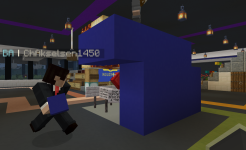- Joined
- Jun 30, 2024
- Messages
- 217
- Thread Author
- #1
Liam Wolfe, Plaintiff
v.
Chris West, Defendant
Civil Complaint:
On March 25th, the Defendant was seen using blue concrete to block off the Plaintiff's rented space in the Defendant's store. The Defendant has since threatened legal action against the Plaintiff, although no discernable reason why has been presented. The Defendant is the one, however, that has committed wrongdoing. According to Section 2a of the Protection of Tenants Act, "Landlords are unable to obstruct, destroy, or otherwise modify rented regions without prior consent." The usage of blue concrete to block off access to the rented property from all directions but one, when the rented properly was previously a freely accessible, open-air plot, counts as obstruction, and violates this Act. This case is brought forward to restore the Plaintiff's full access to his plot, and gain restitution owed by the Defendant under the Protection of Tenants Act.
Parties:
Plaintiff - Liam Wolfe, represented by Lysander Lyon
Defendant - Chris West
Factual Allegations:
1) The Plaintiff's rented plot was previously completely unobstructed and fully accessible, as seen in Exhibit A.
2) The Defendant used blue concrete to obstruct all sides of the rented plot, leaving a 1x2 hole, as seen in Exhibits B, C, D, and E.
3) Obstruction of a rented plot is against the Protection of Tenants Act if it is not done with consent, as stated under Section 2a.
Legal Claims:
1) The Defendant's obstruction of the Plaintiff's rented plot violates Section 2a of the Protection of Tenants Act.
Prayer For Relief:
1) A permanent injunction against the Defendant, requiring the removal of the obstruction of the Plaintiff's plot and forbidding the Defendant from acting to obstruct the Defendant's plot again.
2) Payment of a $250 fine for violating the Protection of Tenants Act.
3) Payment of any and all court fees incurred by the Plaintiff for the duration of this case.
4) Payment of $5,000 in special damages to cover the legal fees incurred by the Plaintiff as a result of the Defendant's actions.
Verification:
I, Lysander Lyon, hereby affirm that the allegations in the complaint AND all subsequent statements made in court are true and correct to the best of the plaintiff's knowledge, information, and belief and that any falsehoods may bring the penalty of perjury.
v.
Chris West, Defendant
Civil Complaint:
On March 25th, the Defendant was seen using blue concrete to block off the Plaintiff's rented space in the Defendant's store. The Defendant has since threatened legal action against the Plaintiff, although no discernable reason why has been presented. The Defendant is the one, however, that has committed wrongdoing. According to Section 2a of the Protection of Tenants Act, "Landlords are unable to obstruct, destroy, or otherwise modify rented regions without prior consent." The usage of blue concrete to block off access to the rented property from all directions but one, when the rented properly was previously a freely accessible, open-air plot, counts as obstruction, and violates this Act. This case is brought forward to restore the Plaintiff's full access to his plot, and gain restitution owed by the Defendant under the Protection of Tenants Act.
Parties:
Plaintiff - Liam Wolfe, represented by Lysander Lyon
Defendant - Chris West
Factual Allegations:
1) The Plaintiff's rented plot was previously completely unobstructed and fully accessible, as seen in Exhibit A.
2) The Defendant used blue concrete to obstruct all sides of the rented plot, leaving a 1x2 hole, as seen in Exhibits B, C, D, and E.
3) Obstruction of a rented plot is against the Protection of Tenants Act if it is not done with consent, as stated under Section 2a.
Legal Claims:
1) The Defendant's obstruction of the Plaintiff's rented plot violates Section 2a of the Protection of Tenants Act.
Prayer For Relief:
1) A permanent injunction against the Defendant, requiring the removal of the obstruction of the Plaintiff's plot and forbidding the Defendant from acting to obstruct the Defendant's plot again.
2) Payment of a $250 fine for violating the Protection of Tenants Act.
3) Payment of any and all court fees incurred by the Plaintiff for the duration of this case.
4) Payment of $5,000 in special damages to cover the legal fees incurred by the Plaintiff as a result of the Defendant's actions.
Verification:
I, Lysander Lyon, hereby affirm that the allegations in the complaint AND all subsequent statements made in court are true and correct to the best of the plaintiff's knowledge, information, and belief and that any falsehoods may bring the penalty of perjury.




